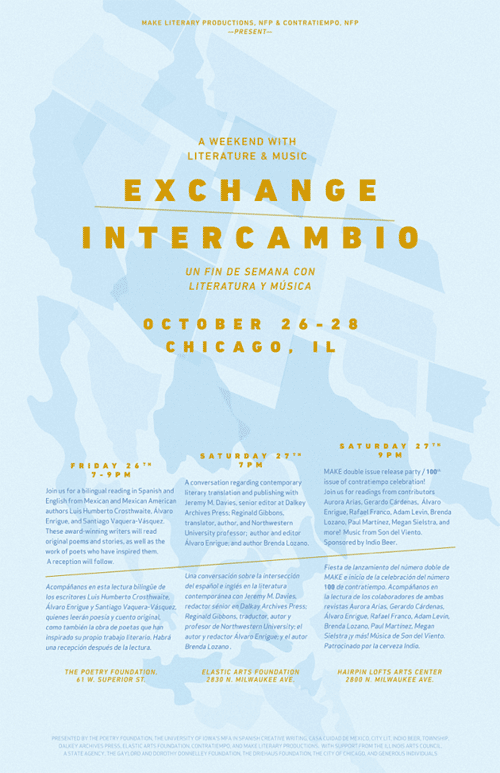| « 2012 Chicago Book Expo Postponed | Janet Groth @ Women and Children First » |
Interview Wed Oct 24 2012
MAKE Mag's Bilingual Issue & What Lit Mags Look For
There's quite a bit on the horizon for MAKE Literary Productions in the coming weeks; events related to the release of the publication's first bilingual issue, #13 Exchange/Intercambio, will usher the Spanish/English magazine into the world on October 26 and 27. 
Friday's event includes a reading and reception with award-winning author Luis Humberto Crosthwaite among others. And on Saturday, MAKE will host a discussion on the art of translation with senior editor of Dalkey Archives Press, Reginald Gibbons, along with authors Alvaro Enrigue and Brenda Lozano. All that is followed by a double issue release celebration at The Hairpin Lofts for MAKE and the 100th issue of the Spanish publication Contratiempo, with readings, beer and music by Son del Viento.
MAKE's managing editor (and one of its founders) Sarah Dodson, took a few moments to discuss what it's like behind the scenes of a literary magazine -- plus, she offers an insider's perspective on what magazines are looking for when they wade through submissions.
Can you tell us a little bit about the bilingual issue?
Every piece of fiction and non-fiction have been translated with the exception of a couple pieces of fiction that will appear translated online. Everything that's prose appears in both English and Spanish, and the majority of writing that was written in Spanish are from Mexico.
Were there particular challenges with this issue that set the production process apart from past issues?
It was hard to work out process would be especially, when the work was being translated and then edited. Who would edit it, and at what point in the process would those edits be made? We had to make it up as we went along, talking to a lot of people who had worked with translators in the past to get a sense of what was appropriate. There was a lot of learning involved.
The other challenge was that there were just more pages, so when it came down to editing everything it was almost twice as many pages as previous issues. It took so much longer and we hadn't really written that extra time into the plan.
What inspired you to put a bilingual issue together?
As we've gotten older we've been taking notice of authors who are writing outside the United States who aren't being translated. Knowing people living outside the U.S., we thought it would be interesting to approach the writing from a literary magazine's perspective. We wanted a challenge as far as getting new content and new understanding of the literaturebeing produced, and in particular literary translations.
As a long-time literary magazine editor, what advice would you give to writers submitting their work, or thinking about it?
It's important for writers to work out their pieces and send in polished, finished work, and that's something that having a network of fellow writers can be helpful with. Anyone who is not an old hand at submitting should know they should always submit their best work, and their finished work, because even if it doesn't work out for that issues they've tried their hardest and that may stick in the editors mind. They might be remembered. If it seems like it's going to be a lot of work, no matter how promising a piece is, you have to think about the challenges of editing a piece with someone who doesn't seem that concerned with the process.
What work, aside from extensive revision, should a writer put into readying a piece for submission?
Literary magazines do our best to read everything carefully, but we don't send feedback. Ifyou want criticism, I would recommend always having a group of friends that you share your writing with, people you've been in class with and people you trust to honest with you. Meeting people through a class helps--it's always important to have people read your work
Also, always read the publication first. I think there's a pretty particular aesthetic at MAKE. All the editors read beyond their preferences but it's still--you can read the magazine to decide if your work is a good fit or not.









